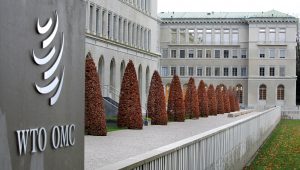Lord Waverley on WTO: Inclusive and Sustainable Trade Reforms are Vital for Shared Benefits
 The previous US administration, the politicisation of trade and a looming economic crisis due to the pandemic and Brexit are creating an environment of protectionism. This must not be allowed to happen, argues Lord Waverley.
The previous US administration, the politicisation of trade and a looming economic crisis due to the pandemic and Brexit are creating an environment of protectionism. This must not be allowed to happen, argues Lord Waverley.
The need has never been greater to deliver inclusive and sustainable trade reforms, and the opportunity to deliver could be now.
The incoming World Trade Organisation director-general, the upcoming G7 meeting in the UK, and the identification of impediments to reform could make this a reality. This would build on the work of G20 finance ministers at the World Bank and the IMF.
The major contributing factor to reform was the failure to implement the WTO Doha round. Reduction in government spending on subsidies in agribusiness were held hostage in the US and the EU to the detriment of developing economies.
That was regrettable. Major benefits could come from freeing-up economies. A broad zero-tariff regime would create wealth in impoverished nations and bring employment and new participants to the supply-chain cycle from the developing world. Making trade reform happen should become our mantra.
“The UK’s call for a more balanced and honest debate on trade reform is welcome if we are to lead by example and move the dial on the world stage. What we never debate is what we are prepared to give up to make this possible.”
There is simmering hope that change might be afoot. The UK must stand ready to lead on the front foot. It is easy to call for WTO reform, but for some governments the rhetoric masks the unsavoury reality that trading systems are stuck in the 1990s. Digital trade and services are systems that fail to live up to modern interconnectivity and speed. Processes are hopelessly antiquated in sectors such as agriculture, with farmers unable to compete with the heavy subsidies in G7 economies.
Trade is ultimately give-and-take. Everyone at the table needs to contribute to a deal that works to the benefit of all. Ngozi Okonjo-Iweala, the first African to head the WTO, has a reputation that suggests that she could deliver. We stand ready in support. Africa, interestingly, is where we could improve the multilateral system for intra-regional trade. It is a region where future-proof rules and standards could easily be incorporated.
The opportunity to build-in modern digital trade infrastructure is enormous, but requires support and investment from the global community. Root problems remain on modernising the digital rulebook, with India and South Africa creating a stumbling blocking effect. Understanding the role of these two G20 economies is as vital as understanding those of the EU, China and the US.
The UK’s call for a more balanced and honest debate on trade reform is welcome if we are to lead by example and move the dial on the world stage. What we never debate is what we are prepared to give up to make this possible.
This is key if we are to make meaningful progress. We must bridge the dialogue gap and find more sustainable and inclusive solutions for all nations, and do so regularly, to keep abreast of changes. New opportunities will drive innovation and solutions to the challenges we face.
The Commonwealth also has an important role to play as a diverse, cross-regional network. It’s a microcosm of WTO membership, and a perfect proving ground for global policy-making and co-operation. If agreement can be found in the Commonwealth, the chances are it will work in the wider trade community.
Capacity building is an important part of the reform challenge. Strengthening the connectivity between Geneva and national capitals is also at the heart of the problem. Too often there is a disconnect, which means we lose the ability to move forward because the flow of dialogue is not happening as it should. In the case of developing countries, teams are often over-stretched and under-resourced, putting them at a significant disadvantage. Input from national capitals and business communities in home countries is vital to enable trade negotiators in Geneva to move forward with confidence when being challenged to make commitments.
Not only has the UK not delivered on Doha, it has now drastically cut the aid budget, a lifeline to help developing countries build trade capability. A decision that looks hasty in the context of G7 – where the UK is arguing for serious change – has undermined its position by removing a key bargaining chip on foreign aid assistance.
Development assistance is vital if any proposal is to succeed, and must be delivered to achieve the opening-up all economies. The government is right to call for WTO reform, but we should stop pointing fingers and have a more honest conversation with ourselves about what we are prepared to give up. Only then will we really make trade work for everyone.
About the Author
Lord (JD) Waverley
Independent Member
House of Lords
Twitter: @LordWaverley
LinkedIn: linkedin.com/in/jdwaverley
You may have an interest in also reading…
WIF: Start-Up Democracy Tunisia Steals the Show
Interim Prime-Minister Mehdi Jomâa of Tunisia has offered to host the next World Investment Forum (WIF), scheduled to take place
Otaviano Canuto: The Dollar’s ‘Exorbitant Privilege’ Remains
Otaviano Canuto discusses the ongoing role of the greenback in international monetary systems… There has been talk of “de-dolarisation” of
Aid for Trade: Supporting the World’s Poorest
The Heads of Agency of the Enhanced Integrated Framework (EIF) – Aid for Trade in action for Least Developed Countries
















































































